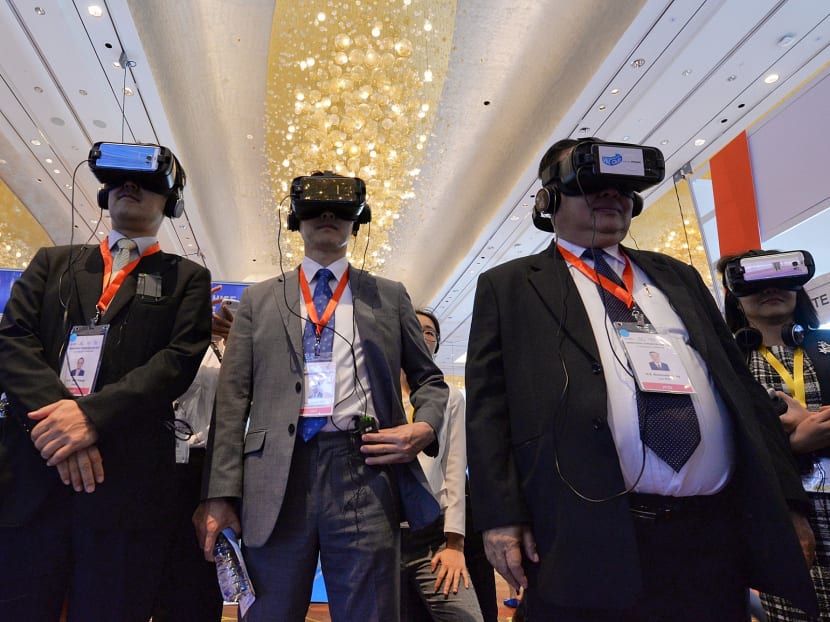Government tenders worth an estimated S$2.4 billion to be given out
SINGAPORE — A projected S$2.4 billion worth of government infocomm technology (ICT) tenders will be given out this financial year, with a big shift to roll out digital and data projects to support the Smart Nation drive, the Government Technology Agency (GovTech) said.

Participants trying out virtual reality for use in educational application at the Infocomm Media Business Exchange 2017, on May 23, 2017. Photo: Robin Choo/TODAY
SINGAPORE — A projected S$2.4 billion worth of government infocomm technology (ICT) tenders will be given out this financial year, with a big shift to roll out digital and data projects to support the Smart Nation drive, the Government Technology Agency (GovTech) said.
The estimated value of the tender this year is less than last year’s S$2.8 billion projected and actual spending.
Making the announcement Wednesday (May 24), GovTech said that a good portion of the budget would be allocated towards tackling cyber security (22 per cent), with a tender to be called by the first half of 2018 for a Government Security Operations Centre, which is focused on detecting cyber threats as well as data analytics.
Under the Smart Nation projects, a proof of concept for smart lamp posts — to support the Smart Nation Sensor Platform — will be built, for example. There are plans to set up sensors in these lamp posts with the purpose of tracking data, such as environmental data, for instance, or to send out traffic alerts.
The Smart Nation Sensor Platform is also a GovTech initiative, to enable public agencies to collect and analyse data from millions of sensors islandwide through an interconnected operating system.
In another project, Temasek Polytechnic will build an inventory robot using radio-frequency identification (RFID) technology in its library, to do more and faster stock-taking of books, and to detect missing or wrongly shelved books. RFID technology is usually used to track objects via tags or chips.
Spending tied to cyber security, digital and data projects, and the Smart Nation movement together constitute more than half of financial year (FY) 2017’s budget.
Apart from the 22 per cent for digital and data projects, nine per cent is going to Smart Nation projects, with infrastructure taking up 29 per cent.
Last year, infrastructure took up 66 per cent, while 4 per cent went to digital and data projects, and Smart Nation projects took up just 1 per cent.
Ms Jacqueline Poh, chief executive of GovTech, said that a large component of ICT expenditure in FY2016 was to build the foundation for a Smart Nation — basic infrastructure that had to be there to ensure “there is capacity for the growth of Smart Nation applications”.
This year’s budget is lower than last year’s because there were a few high-value ICT infrastructure projects last year that would be carried out over a few years.
They are mainly bulk tenders for personal computers and network equipment cabling, among others.
Separately, another S$300 million was allocated for smart projects under the Integrated Health Information Systems, an arm of the Health Ministry (MOH).
Some of the spending will go to disease prevention and management programmes, home diagnostic toolsets for individuals to self-evaluate their health, assistive robots, and near-real-time surveillance of diseases and services, and more.
Mr Bruce Liang, chief information officer at the MOH, said that over the next five years, the ministry expects to increase its procurement of IT services and technologies “by at least 25 per cent”.
He was referring to the strategic shifts from hospital- to community-based care, among others.
Some other projects under the S$2.4 billion worth of tenders
• Ministry of Education: A Parents Gateway for parents to access digital services, such as giving consent for school programmes, or to track their child’s progress. There is also a proposed digital shopfront for examination operations, where candidates may register for exams and receive alerts.
• National Library Board: A virtual library with digital content such as e-books and audio e-books, and an Immersive Story Telling Room to be piloted in the third quarter of 2017. This is to enable stories to be told with animation and sound effects in the room.
• Smart Nation Sensor Network: Sensors will be built to facilitate data-sharing across government agencies, with the aim of improving operational efficiency in urban planning, such as crowd control, flood monitoring and traffic congestion.






